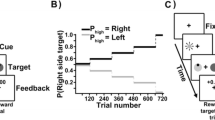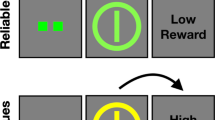Abstract
Reward-predicting cues attract attention because of their motivational value. A debated question regards the conditions under which the cue’s attentional salience is governed more by reward expectancy rather than by reward uncertainty. To help shedding light on this relevant issue, here, we manipulated expectancy and uncertainty using three levels of reward-cue contingency, so that, for example, a high level of reward expectancy (p = .8) was compared with the highest level of reward uncertainty (p = .5). In Experiment 1, the best reward–cue during conditioning was preferentially attended in a subsequent visual search task. This result was replicated in Experiment 2, in which the cues were matched in terms of response history. In Experiment 3, we implemented a hybrid procedure consisting of two phases: an omission contingency procedure during conditioning, followed by a visual search task as in the previous experiments. Crucially, during both phases, the reward–cues were never task relevant. Results confirmed that, when multiple reward-cue contingencies are explored by a human observer, expectancy is the major factor controlling both the attentional and the oculomotor salience of the reward–cue.




Similar content being viewed by others
References
Anderson, B. A., & Halpern, M. (2017). On the value-dependence of value-driven attentional capture. Attention, Perception and Psychophysics. https://doi.org/10.3758/s13414-017-1289-6.
Anderson, B. A., Laurent, P., & Yantis, S. (2011). Value-driven attentional capture. Proceedings of the National Academy of Sciences of the United States of America, 108(25), 10367–10371. https://doi.org/10.1073/pnas.1104047108.
Anderson, B. A., Laurent, P., & Yantis, S. (2012). Generalization of value-based attentional priority. Visual Cognition, 20(6), 37–41. https://doi.org/10.1080/13506285.2012.679711.
Anderson, B. A., & Yantis, S. (2012). Value-driven attentional and oculomotor capture during goal- directed, unconstrained viewing. Attention, Perception & Psychophysics. https://doi.org/10.3758/s13414-012-0348-2.
Awh, E., Belopolsky, A. V., & Theeuwes, J. (2012). Top-down versus bottom-up attentional control: A failed theoretical dichotomy. Trends in Cognitive Sciences, 16(8), 437–443. https://doi.org/10.1016/j.tics.2012.06.010.
Beesley, T., Nguyen, K. P., Pearson, D., & Le Pelley, M. E. (2015). Uncertainty and predictiveness determine attention to cues during human associative learning. The Quarterly Journal of Experimental Psychology, 2, 1–25. https://doi.org/10.1080/17470218.2015.1009919.
Bindra, D. (1978). How adaptive behavior is produced: a perceptual-motivational alternative to response-reinforcement. Behavioral and Brain Sciences, 1(1), 41–91. https://doi.org/10.1017/S0140525X00059380.
Bucker, B., & Theeuwes, J. (2017). Pavlovian reward learning underlies value driven attentional capture. Attention, Perception, and Psychophysics, 79, 1–14. https://doi.org/10.3758/s13414-016-1241-1.
Chapman, C. S., Gallivan, J. P., & Enns, J. T. (2014). Separating value from selection frequency in rapid reaching biases to visual targets. Visual Cognition. https://doi.org/10.1080/13506285.2014.976604.
Chelazzi, L., Perlato, A., Santandrea, E., & Della Libera, C. (2013). Rewards teach visual selective attention. Vision Research, 85, 58–62. https://doi.org/10.1016/j.visres.2012.12.005.
Chen, L., Cheng, Y., Zhou, W., & Mustain, W. D. (2014). Monetary reward speeds up voluntary saccades. Frontiers in Integrative Neuroscience, 8, 48. https://doi.org/10.3389/fnint.2014.00048.
Cousineau, D. (2005). Confidence intervals in within-subject designs: A simpler solution to Loftus and Masson’s method. Tutorials in Quantitative Methods for Psychology, 1(1), 42–45.
Cousineau, D. (2010). Outliers detection and treatment: a review. International Journal of Psychological Research, 3(1), 58–67.
De Tommaso, M., Mastropasqua, T., & Turatto, M. (2017). The salience of a reward cue can outlast reward devaluation. Behavioral Neuroscience, 131(3), 226–234. https://doi.org/10.1037/bne0000193.
Esber, G. R., & Haselgrove, M. (2011). Reconciling the influence of predictiveness and uncertainty on stimulus salience: a model of attention in associative learning. Proceedings. Biological Sciences/The Royal Society, 278(1718), 2553–2561. https://doi.org/10.1098/rspb.2011.0836.
Failing, M., & Theeuwes, J. (2017). Don’t let it distract you: how information about the availability of reward affects attentional selection. Attention, Perception. & Psychophysics. https://doi.org/10.3758/s13414-017-1376-8.
Failing, M. F., Nissens, T., Pearson, D., Pelley, M., Le, & Theeuwes, J. (2015). Oculomotor capture by stimuli that signal the availability of reward. Journal of Neurophysiology, 114(4), 2316–2327. https://doi.org/10.1152/jn.00441.2015.
Fiorillo, C. D., Tobler, P. N., & Schultz, W. (2003). Discrete coding of reward dopamine neurons. Science, 299, 1898–1902. https://doi.org/10.1126/science.1077349.
Hickey, C., Chelazzi, L., & Theeuwes, J. (2014). Reward-priming of location in visual search. PLoS One. https://doi.org/10.1371/journal.pone.0103372.
Hickey, C., & Van Zoest, W. (2012). Reward creates oculomotor salience. Current Biology. https://doi.org/10.1016/j.cub.2012.02.007.
Hogarth, L., Dickinson, A., Austin, A., Brown, C., & Duka, T. (2008). Attention and expectation in human predictive learning: The role of uncertainty. Quarterly Journal of Experimental Psychology, 61(11), 1658–1668. https://doi.org/10.1080/17470210701643439.
Knight, D. C., Nguyen, H. T., & Bandettini, P. A. (2003). Expression of conditional fear with and without awareness. Proceedings of the National Academy of Sciences, 100(25), 15280–15283. https://doi.org/10.1073/pnas.2535780100.
Koenig, S., Kadel, H., Uengoer, M., Schubö, A., & Lachnit, H. (2017). Reward draws the eye, uncertainty holds the eye: Associative learning modulates distractor interference in visual search. Frontiers in Behavioral Neuroscience, 11, 1–15. https://doi.org/10.3389/fnbeh.2017.00128.
Le Pelley, M. E. (2004). The role of associative history in models of associative learning: a selective review and a hybrid model. The Quarterly Journal of Experimental Psychology. B, Comparative and Physiological Psychology, 57(3), 193–243. https://doi.org/10.1080/02724990344000141.
Le Pelley, M. E., Mitchell, C. J., Beesley, T., George, D. N., & Wills, A. J. (2016). Attention and associative learning in humans: An integrative review. Psychological Bulletin, 142(10), 1–31. https://doi.org/10.1037/bul0000064.
Le Pelley, M. E., Pearson, D., Griffiths, O., & Beesley, T. (2015). When goals conflict with values: Counterproductive attentional and oculomotor capture by reward-related stimuli. Journal of Experimental Psychology: General, 144(1), 158–171. https://doi.org/10.1037/xge0000037.
Le Pelley, M. E., Pearson, D., Porter, A., Yee, H., & Luque, D. (2017). Oculomotor capture is influenced by expected reward value but (maybe) not predictiveness. The Quarterly Journal of Experimental Psychology, 0(0), 1–46. https://doi.org/10.1080/17470218.2017.1313874.
Lovibond, P. F. (2003). Causal beliefs and conditioned responses: Retrospective revaluation induced by experience and by instruction. Journal of Experimental Psychology: Learning, Memory, and Cognition, 29(1), 97–106. https://doi.org/10.1037/0278-7393.29.1.97.
Lovibond, P. F., & Shanks, D. R. (2002). The role of awareness in Pavlovian conditioning: Empirical evidence and theoretical implications. Journal of Experimental Psychology: Animal Behavior Processes, 28(1), 3–26. https://doi.org/10.1037/0097-7403.28.1.3.
Luque, D., Vadillo, M. A., Le Pelley, M. E., & Beesley, T. (2016). Prediction and uncertainty in associative learning: Examining controlled and automatic components of learned attentional biases. The Quarterly Journal of Experimental Psychology. https://doi.org/10.1080/17470218.2016.1188407.
Mackintosh, N. J. (1975). A theory of attention: Variations in the associability of stimuli with reinforcement. Psychological Review, 82(4), 276–298. https://doi.org/10.1037/h0076778.
Mastropasqua, T., & Turatto, M. (2015). Attention is necessary for subliminal instrumental conditioning. Nature Publishing Group. https://doi.org/10.1038/srep12920.
Mine, C., & Saiki, J. (2015). Task-irrelevant stimulus-reward association induces value-driven attentional capture. Attention, Perception, and Psychophysics. https://doi.org/10.3758/s13414-015-0894-5.
Munoz, D. P., & Everling, S. (2004). Look away: The anti-saccade task and the voluntary control of eye movement. Nature Reviews Neuroscience, 5(3), 218–228. https://doi.org/10.1038/nrn1345.
Pearce, J. M., & Bouton, M. E. (2001). Theories of associative learning in animals. Annual Review of Psychology, 52, 111–139. https://doi.org/10.1146/annurev.psych.52.1.111.
Pearce, J. M., & Hall, G. (1980). A model for Pavlovian learning: Variations in the effectiveness of conditioned but not of unconditioned stimuli. Psychological Review, 87(6), 532–552. https://doi.org/10.1037/0033-295X.87.6.532.
Pearson, D., Donkin, C., Tran, S. C., Most, S. B., & Le Pelley, M. E. (2015). Cognitive control and counterproductive oculomotor capture by reward-related stimuli. Visual Cognition, 6285, 1–26. https://doi.org/10.1080/13506285.2014.994252.
Pelli, D. G. (1997). The VideoToolbox software for visual psychophysics: Transforming numbers into movies. Spatial Vision. https://doi.org/10.1163/156856897X00366.
Pessiglione, M., Petrovic, P., Daunizeau, J., Palminteri, S., Dolan, R. J., & Frith, C. D. (2008). Subliminal instrumental conditioning demonstrated in the human brain. Neuron, 59(4), 561–567. https://doi.org/10.1016/j.neuron.2008.07.005.
Pool, E., Brosch, T., Delplanque, S., & Sander, D. (2014). Where is the chocolate? Rapid spatial orienting toward stimuli associated with primary rewards. Cognition, 130(3), 348–59. https://doi.org/10.1016/j.cognition.2013.12.002.
Preuschoff, K., Bossaerts, P., & Quartz, S. R. (2006). Neural differentiation of expected reward and risk in human subcortical structures. Neuron, 51(3), 381–390. https://doi.org/10.1016/j.neuron.2006.06.024.
Robinson, M. J. F., Anselme, P., Fischer, A. M., & Berridge, K. C. (2014). Initial uncertainty in Pavlovian reward prediction persistently elevates incentive salience and extends sign-tracking to normally unattractive cues. Behavioural Brain Research, 266, 119–130. https://doi.org/10.1016/j.bbr.2014.03.004.
Robinson, M. J. F., Anselme, P., Suchomel, K., & Berridge, K. C. (2015). Amphetamine-induced sensitization and reward uncertainty similarly enhance incentive salience for conditioned cues. Behavioral Neuroscience. https://doi.org/10.1037/bne0000064.
Robinson, M. J. F., Robinson, T. E., & Berridge, K. C. (2013). Incentive salience and the transition to addiction. Biological Research on Addiction. https://doi.org/10.1016/B978-0-12-398335-0.00039-X.
Robinson, T. E., & Berridge, K. C. (2008). Review. The incentive sensitization theory of addiction: some current issues. Philosophical Transactions of the Royal Society of London. Series B, Biological Sciences, 363(1507), 3137–3146. https://doi.org/10.1098/rstb.2008.0093.
Roper, Z. J. J., & Vecera, S. P. (2016). Funny money: The attentional role of monetary feedback detached from expected value. Attention, Perception, and Psychophysics. https://doi.org/10.3758/s13414-016-1147-y.
Sali, A. W., Anderson, B. A., & Yantis, S. (2014). The role of reward prediction in the control of attention. Journal of Experimental Psychology. Human Perception and Performance. https://doi.org/10.1037/a0037267.
Sha, L. Z., & Jiang, Y. (2015). Components of reward-driven attentional capture. Attention, Perception, and Psychophysics. https://doi.org/10.3758/s13414-015-1038-7.
Shanks, D. R. (2010). Learning: from association to cognition. Annual Review of Psychology, 61, 273–301. https://doi.org/10.1146/annurev.psych.093008.100519.
Talmi, D., Seymour, B., Dayan, P., & Dolan, R. J. (2008). Human pavlovian-instrumental transfer. The Journal of Neuroscience, 28(2), 360–368. https://doi.org/10.1523/JNEUROSCI.4028-07.2008.
Theeuwes, J., & Belopolsky, A. V. (2012). Reward grabs the eye: Oculomotor capture by rewarding stimuli. Vision Research, 74, 80–85. https://doi.org/10.1016/j.visres.2012.07.024.
Toates, F. (1986). Motivational systems. Cambridge: Cambridge University Press.
Wang, L., Duan, Y., Theeuwes, J., & Zhou, X. (2014). Reward breaks through the inhibitory region around attentional focus. Journal of Vision, 14(12), 2. https://doi.org/10.1167/14.12.2.
Author information
Authors and Affiliations
Corresponding author
Ethics declarations
Informed consent
Informed consent was obtained from all individual participants included in the study.
Ethical approval
All procedures performed in studies involving human participants were in accordance with the ethical standards of the local research Ethics Committee (Comitato per la sperimentazione sull’essere umano dell’Università di Trento) and with the 1964 Helsinki declaration and its later amendments or comparable ethical standards.
Funding
This study was supported by funds to Massimo Turatto from the Center for Mind/Brain sciences (CIMeC) of the University of Trento.
Conflict of interest
The authors declare that they have no conflict of interest.
Rights and permissions
About this article
Cite this article
De Tommaso, M., Mastropasqua, T. & Turatto, M. Multiple reward–cue contingencies favor expectancy over uncertainty in shaping the reward–cue attentional salience. Psychological Research 83, 332–346 (2019). https://doi.org/10.1007/s00426-017-0960-9
Received:
Accepted:
Published:
Issue Date:
DOI: https://doi.org/10.1007/s00426-017-0960-9




